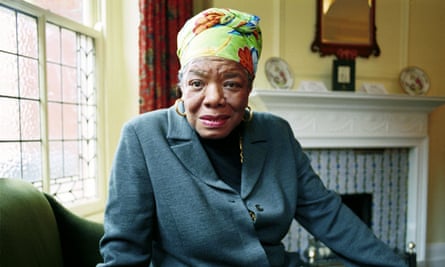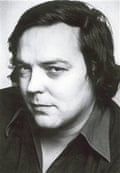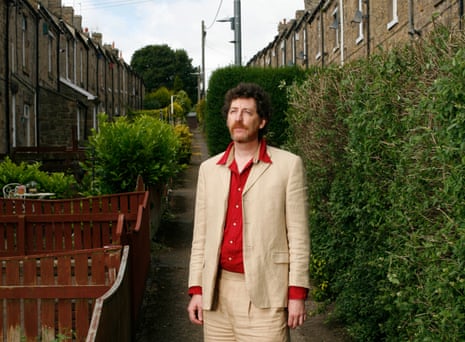The poet Ira Lightman stared at his laptop screen in disbelief. Could it be true? He was sitting on the sofa in his terrace house in Rowlands Gill, five miles south-west of Newcastle, a narrow man with a curly mess of dark red hair. He’d just made a routine visit to the Facebook group Plagiarism Alerts. There, a woman named Kathy Figueroa had posted something extraordinary: “It appears that one of Canada’s former poet laureates has plagiarised a poem by Maya Angelou.”
Lightman clicked the link. It led to a Canadian government webpage where a poem had been chosen to honour the memory of Pierre DesRuisseaux, Canada’s fourth parliamentary poet laureate, who died in early 2016. The poem, it said, had been translated from DesRuisseaux’s French original. Lightman read the opening lines: “You can wipe me from the pages of history/with your twisted falsehoods/you can drag me through the mud/but like the wind, I rise.” The poem was called I Rise. Next, Lightman looked up the Maya Angelou. “You may write me down in history/With your bitter, twisted lies/You may trod me in the very dirt/But still, like dust, I’ll rise.” The poem was called Still I Rise.
Incredible. But could it really be plagiarism? How likely was it that a poet laureate would steal anything at all, let alone a keystone work by a modern legend? How could he think he’d get away with that? Then again, DesRuisseaux was a French speaker, writing for a French-speaking audience. Would his readers necessarily recognise a well-known English-language poem of the 20th century? After all, this had been spotted only because it had been translated into English.
Lightman found the website of DesRuisseaux’s publisher and downloaded a free sample of Tranches De Vie, the book the poem had come from. He scanned the PDF for telling lines that he roughly translated into English, then popped into Google, in quotation marks, alongside the word “poem”. It didn’t take long. There was In The Beginning by Dylan Thomas. There was Prayer Before Birth by Louis MacNeice. There was Cut While Shaving by Charles Bukowski. Unaccredited. Stolen.
In May last year, Lightman contacted the publisher, noting his concerns and requesting a full book be sent for further investigation. The response, from Éditions du Noiroît, one of Canada’s most prestigious publishing houses, was swift. His accusation was “incredible”. Lightman replied, “For me, it’s not so incredible. I have studied numerous plagiarists.” And this was true, for Ira Lightman was no ordinary poet – he was also the poetry sleuth. And it looked as if this might be his biggest catch yet.
Lightman is feared, reviled and lauded in the poetry world. For some, he’s a tireless vigilante, bravely aiming his chin at his enemies. For those enemies, he’s a bully and a witch-finder with an unnatural obsession. For others still, he’s in error; some of his targets aren’t plagiarists at all, they argue, just sloppy note-keepers. Moreover, Lightman makes no allowances for the practice of “intertextuality”: when you take someone else’s poem and use its structure, mood or language as a foundation for something new. You might use intertextuality to comment on the original poem, for example, or alter it in such a way that it moves into your own lived experience. Perhaps a late-life experiment could explain the Canadian laureate’s apparent thieving. It might just turn out to be DesRuisseaux’s last opportunity to have his reputation restored in the pages of history and to rise (rise, rise) like the dust/wind.
It was an insult on Facebook that triggered Lightman’s first investigation. It was around 8am on a January morning in 2013 when he came across a tense discussion concerning a poet named Christian Ward, who’d had the Exmoor Society’s Hope Bourne prize removed because of his winning entry’s similarities to another poem, Deer by Helen Mort. “There was bucketloads of speculation,” Lightman says. We’re in his lounge, the litter of his creative life scattered about us: a ukulele, an enormous dictionary, posters with verse and his name printed at the bottom. He sits, suited and crane-like, on the sofa. “Everyone was arguing about it: maybe it was an accident, maybe the judges weren’t poetry people and don’t understand intertextuality.” Lightman was erring on the side of cock-up. Only the previous day, he’d come across a poem of his own that he had no memory of writing. Perhaps Ward had found Deer in his files, assumed it was his, given it a polish and submitted it. “I could just about accept that,” he says. “You can be very prolific and amnesiac.” He remembers joining the debate as a “peacemaker”. But then a commenter called Sadie Fisher said something that annoyed him.

While the Mort poem was available online, nobody on the Facebook group had actually seen Ward’s, she pointed out. “Sadie Fisher was saying, ‘You guys are all hacks. A proper journalist would look into it and say, ‘Is this a spoof story? Have they got the facts wrong?’”
Lightman felt piqued. “I’ve always been interested in journalism,” he says. “My grandfather was a subeditor for an Edinburgh paper. So I thought, I’m going to find out.” He phoned Bridgwater library and asked if they had the Exmoor Society quarterly that published the winners. “They said no, but Porlock might, and they’re opening in 10 minutes.” An anxious 10 minutes passed. “I rang Porlock and they said, ‘We’ve got it.’ I said, ‘OK’, heart beating.” As the librarian fetched the journal, Lightman Googled the Mort poem. When she came back to the phone, he asked her to read it out, ready to scribble it down so he could compare them. That turned out to be unnecessary. “It was totally identical, except for about 5%.”
How did that feel?
“It was amazing. Just, oh, wow.”
“But you’re also thinking, fuck you, Sadie Fisher?”
“There was a tiny bit of that.”
Lightman typed up the poems and posted them both on Facebook, telling everyone they could stop speculating. But a couple of days later, a friend sent him another suspicious Ward poem. “This felt like a different ballgame,” he says. For the first time, the poetry sleuth felt overcome by the distant whiff of blood. “I really wanted to get to the bottom of it. And then I was just really thorough. I looked at absolutely everything.”
He developed a technique. He’d try to spot breaks in the natural pattern of Ward’s poems – jarring lines that felt, in some way, different. If Lightman has a secret superpower, it’s that, beneath his own instinct for poetry, he has a mathematician’s pattern-sensitive brain. “It surprises me, because people say, ‘I looked through this person’s work and I didn’t see anything’, then I find something in two minutes. It’s because I’m not reading it for affect, I’m reading it for patterns.” He went through all the Ward poems he could find. “I looked through 300 or 400,” he said. “I found about 15 that were dodgy.” It was this that taught him his golden rule: “Plagiarists never do it once.”
Lightman posted the poems on Facebook. For Ward, this was a catastrophe. His cheating became national news, and was reported in the New York Times (headline: Nice Poem; I’ll Take It). He gave a statement to the Western Morning News, apologising to Mort and “the poetry community” and admitting he had been “careless”. Ward had already, he said, found another suspect poem of his own: “I have discovered a 2009 poem called The Neighbour is very similar to Tim Dooley’s After Neruda... I am still digging.”
Ward did not respond to my requests for an interview, but someone who appears to have been him left a lengthy comment beneath the Guardian’s news story in 2013. “ChristianWard99” said it was “one of the most uncomfortable and distressing experiences of my life”, admitting, “I have made several stupid mistakes during my time as a poet and there is simply no excuse for plagiarism.” But he also pushed back: “I have been bullied, victimised and abused by a number of ‘poets’ who thought it necessary to act like a lynch mob.”
Of all the plagiarists he ended up netting, Lightman says he retains most respect for Ward. “He’d had a poem published in the Poetry Review and it was perfectly legitimate, written in his own voice, own style. I think he was on the verge of making something. He just messed up.” He also admires the way Ward dealt with it: “He never tried to shrug it off.”
What makes a poetry sleuth? In the case of Lightman, it seems to be an unusual combination of anger, vulnerability and an intoxicating desire to feel powerful. Born to middle-class parents in 1967, Lightman was an unusual and sometimes difficult child. When, at the age of three, he was told the family were moving from Buckinghamshire to Kent, he pulled down his trousers and refused to pull them up again until they changed their minds. (“It didn’t work.”) At school, he wore his hair like Rowan Atkinson’s character in Blackadder I. “The defining thing for me, as a child, was, I was not very good at making friends. I was very good at getting bullied, but I was really good at having some power.” He won a public speaking competition and kept on winning it, year after year, revelling in the glory of witnessing everyone sing a new verse in the school hymn, which he’d composed. “I was a walking liability.”
Despite his talent for maths, Lightman pursued the arts, studying English language and literature at University College London. He’d written bits of poetry as a teenager, but embraced the form seriously as a student, and quickly began to get Larkin-like work published in titles such as the London Magazine and the New Statesman. After university, he spent time in New Zealand, returning to the UK in 1991. In 2000, he moved to County Durham, got married and had two children. Lightman’s marriage formally ended last year, but had been failing for some time. What buoyed him through the breakup, he says, was the community he found online. He was liked there. And when he became known for his poetry sleuthing, he was also powerful. “I needed Facebook desperately. It was a total godsend.”
In retrospect, he thinks this dependency might have interfered with his judgment during his investigation of Christian Ward. “My procedure was far too engaged with my own excitement about Facebook and getting notifications,” he says. “I was posting every single finding: here’s number seven, here’s number eight.”
Did his investigations also give him status? “I think I was angry,” he says. “Not at the plagiarists. I felt like I was drowning. And you’re right, there’s an element that makes you feel good.”
What was he angry about?
“Just not feeling very loved.”
In the spring of 2015, a friend tipped Lightman off about a potential new case. This one would become ugly and difficult in ways that none of the others had been, not least because this much-admired poet lived in Tynemouth, just a few miles down the road.
The first person to smell something suspicious about the popular north-east poet and tutor Dr Sheree Mack was another local poet, Ellen Phethean. She’d been to the launch of Mack’s book Laventille, and had noticed work that was uncomfortably similar to her own. She contacted the publisher, Andy Croft at Smokestack Books, who contacted Mack. She told him she’d made a mistake: she had used a number of poems as scaffolding upon which to build her own work and, due to poor record-keeping, had failed to make the appropriate attribution. In her checking, she’d also discovered the initials “JJ” next to her poem A Different Shade Of Red. That, she now realised, was originally based upon A Particular Blue by another local poet, Joan Johnston.

“Andy Croft emailed me a copy of Sheree’s poem and said, ‘What do you think?’” Johnston tells me when we meet, at Lightman’s house. “I told him, ‘It’s my poem.’ Then I went to walk the dogs, very quickly, very furiously, around a couple of fields. When I got back, I emailed him again and said, ‘I’m absolutely furious about this.’” She sent Croft a copy of A Particular Blue, so he could see for himself. “He returned both poems to me, having highlighted the changes Sheree had made, saying, ‘I don’t think it’s plagiarism. I think she’s taken your poem and made something new out of it.’ At which point, I went for another walk.”
Were the similarities down to Mack’s sloppy note-keeping? Was it intertextuality? Or a bit of both? If anyone was going to find out, it was the poetry sleuth. Lightman decided to approach this case as he had all the others, contacting the accused via email, offering support and inviting confession, while commencing an investigation. Lightman found 12 poems in Laventille he thought extremely similar to other work. Checking Mack’s previous book, Family Album, he found another “six or seven” problematic poems. More seriously, he thought he’d read Mack saying that Family Album comprised the creative element of her PhD. He contacted the University of Newcastle, which had supervised it, explaining the potential issues. When there was no response, he decided to find a copy of the doctoral thesis himself, only to discover it had mysteriously disappeared from the university’s catalogue. “They pulled it off for a year, so I couldn’t look at it,” he says.
When it returned, “I expected to see something that had been retroactively altered, but the poems from Family Album were still there, uncredited.” The body of the thesis raised further issues. “The PhD is beyond the pale,” Lightman says. “There were around 100 things I found problematic.” (A university spokesperson told the Guardian, “The thesis was taken from the university library to be read following the allegation and was subsequently returned. A formal investigation is still ongoing.”)
Meanwhile, news of Mack’s difficulties spread. A debate raged in blogs and specialist poetry publications and, of course, on Facebook. “I was really surprised at the vitriol directed at Ira,” Johnston tells me. “And also the vitriol towards any of us who were saying, ‘This is wrong’, as though we were the problem.”
Lightman felt there was a level of hypocrisy in all this, with friends and associates making allowances for Mack that they wouldn’t make for strangers. “All the buggers who’d called Christian Ward a scumbag and said, ‘There’s no excuse for this’ were saying, ‘I’m sure Sheree has a reason.’ It was galling.”
Perhaps inevitably, one of Lightman’s fiercest critics was Mack’s publisher, Andy Croft. On 7 May 2015, he emailed Lightman: “Although I do not know you or your work, it has been explained to me that you are currently trying to make a career as a witch-finder general in the world of poetry. But this feels less like a witch-hunt than a lynch mob. As I am sure you are aware, your accusations have caused Sheree considerable distress.” Croft explained that he planned to pulp the remaining copies of Laventille and reprint a corrected version. “I do not believe that your accusations of plagiarism regarding Laventille are justified. But I am not prepared to have this beautiful and important book dirtied by the grubby little fingers of Pooterish readers.” Croft then posted his email as an open letter on Facebook.
Mack herself posted a semi-apology on Facebook, admitting to “slackness and carelessness”, while insisting: “Never, never, have I set out to deceive, mislead, or appropriate the work of others.” She refused media requests (and declined to speak to me for this story).
However, in 2016, Mack published a memoir, Rubedo, that recounted what she described as “a public lynching of me the writer, poet and person”. She put the problems down to a “lack of necessary diligence” in keeping track of her sources, and her practice of intertextuality. “Where I have carried this out, I have created a whole new piece of writing that feeds from my own experiences, interests and heritage.” She denied any wilful sin. Although she didn’t mention Lightman by name, she didn’t have to. The moment “a certain poet” posted his allegations on Facebook, she wrote, “he sealed my fate… He was two-faced and backstabbing.” When she discovered her employment as a lecturer at the Open University had been terminated, she writes, she considered jumping off a bridge.
This made me wonder if Lightman had ever considered the question of balance. Mack’s poems weren’t all questionable; everyone agrees she was an inspiring teacher; her book Laventille had sold only 114 copies. His investigation left her suffering something approaching an annihilation of the self. Did he wrestle with that?
“Yes,” Lightman says, “but you can’t undo what you’ve done.”
He doesn’t think he went too far?
“No, I don’t.”
I wonder what he and Johnston ultimately wanted. What would leave them satisfied?
“I don’t want a public flogging or anything,” Johnston says, “but if quietly her doctorate was taken away, that would be fair.”
A few weeks later, I meet Andy Croft at an anarchist book fair at Goldsmiths, University of London. In black jeans and a white T-shirt, his spectacles hooked over the neck and his grey hair brushed back, he is behind a stall, selling copies of Smokestack’s books. Laventille is not among them.
I ask what he thinks motivates Lightman. “I honestly don’t know,” he says. “My only contact with his career is with someone who lacks proportion and lacks humility and lacks generosity.” He characterises the fuss as nothing more than “a series of low-level petty jealousies”. Mack, who is of Trinidadian/Ghanaian/Bajan ancestry, “is one of the tallest, most striking women you’ve ever come across”, Croft says. “A lot of the original animosity was from white women poets in Newcastle. I don’t even want to know how to unpick that. To begin with, it felt like some girls in a catfight, picking on the most glamorous and the most beautiful girl, because they’re not as glamorous and beautiful.” I put this accusation to Johnston, but she declined to comment.
Mack was, Croft insists, mostly guilty of sloppiness. She’d been practising intertextuality and had forgotten to add the appropriate attributions. Mack, of course, claimed she always “created a whole new piece of writing”, but a comparison between her A Different Shade Of Red and Johnston’s A Particular Blue, for example, strains that argument. Johnston’s begins: “This afternoon the weather broke/and changing light/brought back morning.” Mack’s: “This evening the weather broke/and threatening light/brought into the long night.”
How close would two poems have to be for it to be plagiarism, I ask Croft.
“Um,” he says, “it would only arise if I noticed. I’m very widely read, but the chances are I’d miss it.”
Would it have to be a facsimile?
“I suppose if someone typed up a poem as it was originally and just put their name at the bottom, I’d say, why are you doing that?”
And would it be plagiarism?
“It would be…” He thinks for a moment. “Pointless. It’s like me saying my name is Will Storr. No, it’s not! You’d say that was stupid. You wouldn’t say I was plagiarising you.”
The second time I visit Ira Lightman, I press him on his claim to have wrestled with the question of moral balance between Mack’s crime and punishment. Since his last communication with the University of Newcastle, he has halted his attempt at getting her doctorate removed, partly because he is worried about damage to his own reputation. But he says he might begin again if he finds she’s using her doctorate to gain employment. He tells me he has read Rubedo, with its account of Mack’s lowest moments. Did it change anything?
“I can completely imagine that was an awful time for her,” he says. “But I don’t think I’d behave in a different way.”

Meanwhile, what of the Canadian mystery? Could former laureate DesRuisseaux really have blatantly plagiarised all those canonical poets? It seemed too mad to be true. When Lightman got hold of DesRuisseaux’s book Tranches De Vie, he found even more apparent thefts. Two days of sleuthing found 30 out of 47 poems that were heavily based on the work of others. There were two more by Angelou, an Anna Akhmatova, a Federico García Lorca, a Ted Kooser. There was even a Tupac Shakur. When Lightman told me he’d failed to find any problems in other DesRuisseaux books he’d got hold of, I recalled his “golden rule”, that plagiarists never do it only once. It seemed to me that Tranches De Vie must have been an attempt to honour the greats by producing intertextual reinterpretations of their finest moments.
Until, that is, Lightman shows me the original source of DesRuisseaux’s Curieux. “It’s based on a poem by Nicole Renwick,” Lightman tells me. “I’d never heard of her, but that does happen.”
He taps her name into his search engine. We’re sitting next to each other and I lean over, squinting at the screen. Some examples of Renwick’s work appear on a site called allpoetry.com. There is the original poem, Funny… But Not. DesRuisseaux had cut it down from 13 lines to nine, and added his own closer. And then there’s Nicole Renwick herself. She looks barely out of her teens. Her bio reads: “Hey everyone, I’m hoping to become a writer one day, so I’d appreciate every comment I get thanks.”
Lightman scrolls down. The poem that follows the one DesRuisseaux had taken is called My Xbox. I read its opening stanza: “Xbox, Xbox/You’re the one for me/I also love my 3DS/And my Nintendo Wii.”
“We’re not talking Seamus Heaney,” Lightman says.
I stare at the screen in mute astonishment.
“What was he doing?” He shakes his head. “What was he doing?”
Later, I contact Professor Thierry Bissonnette of Laurentian University’s department of French studies in Ontario, who had not only read DesRuisseaux widely but knew him late in life. When he tells me he enjoyed Tranches De Vie – “That’s a good one” – I share Lightman’s accusations.
“Oh, wow,” he says.
“Are you familiar with intertextuality?” I ask
“Yeah.”
“Is there a chance he was doing this in Tranches De Vie?”
“No,” he says. “Not at all.”
Lightman completed his investigation into Tranches De Vie in May 2016, but speaking to me is the first time he has gone public. He emailed his findings to Éditions du Noiroît, who appeared to accept his verdict; in emails Lightman showed me, DesRuisseaux’s editor wrote that it was his first experience of plagiarism, and expressed regret at having to tell the poet’s family that he would have to remove the title from circulation.
Tranches De Vie is no longer on sale. Lightman advised the editor to make a public statement, but at the time of writing, nearly 18 months later, none has been made. I email the poetry sleuth to ask if this surprises him. His reply comes as one word: “Nope.”

Comments (…)
Sign in or create your Guardian account to join the discussion